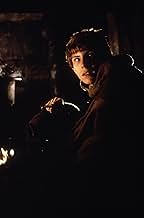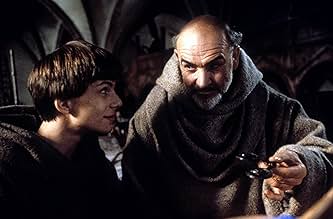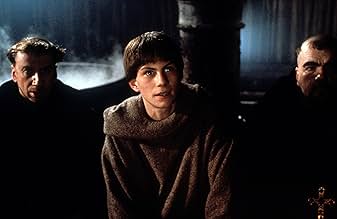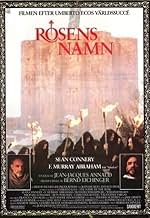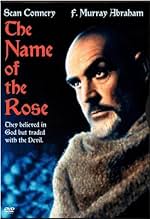एक बौद्धिक रूप से गैर-अनुरूपतावादी तपस्वी एक पृथक अभय में रहस्यमय मौतों की एक श्रृंखला की जांच करता है।एक बौद्धिक रूप से गैर-अनुरूपतावादी तपस्वी एक पृथक अभय में रहस्यमय मौतों की एक श्रृंखला की जांच करता है।एक बौद्धिक रूप से गैर-अनुरूपतावादी तपस्वी एक पृथक अभय में रहस्यमय मौतों की एक श्रृंखला की जांच करता है।
- 2 BAFTA अवार्ड जीते गए
- 17 जीत और कुल 6 नामांकन
- Pietro d'Assisi
- (as Donal O'Brian)
फ़ीचर्ड समीक्षाएं
It's true that the film, directed by Jean-Jacques Annaud, has to skip, or skirt, much of Eco's detail - the famous pages-long description of the doorway, for example, is acknowledged by a few camera shots - but it takes the novel's literary strengths and offers a cinematic equivalent: a vivid depiction of monastic life which thrusts the viewer into the period of the story. In this respect, the production is exemplary: cinematographer Tonino Delli Colli, art director Dante Ferretti and composer James Horner were all operating at the top of their game.
And, as Renton in Trainspotting (1996) knows, Sean Connery proved a perfect choice as William of Baskerville, the 14th-century Sherlock Holmes figure investigating the deaths in an Italian monastery. It's one of Connery's best performances, a happy marriage of character acting and star casting: he suits the physical description of William and he properly conveys the character's wisdom, caution and sense of regret. Christian Slater's Adso, the narrator of the novel, is a surrogate for the viewer, expressing bafflement at the mystery story and awe at William's deductive powers; while F. Murray Abraham works wonders with the underwritten part of the inquisitor Bernardo Gui.
The Name of the Rose is one of the most underrated movies of the eighties. That it wasn't brilliant should not detract from the fact that it's as good as it is.
Anyone who has read Umberto Eco's book knows how detailed the author is in portraying these complex aspects, which are no longer obvious or easily understandable for a contemporary reader. Umberto Eco certainly has his own opinions on these themes, but still manages to paint a very authentic literary picture of that era.
Does the film achieve the same? No.
The casting is wonderful, especially Connery, but young Adso, played by Slater, is also well interpreted. The film focuses on the story of the investigation, which is undoubtedly the thread that ties the narrative together.
What bothers me most about this film is the depiction of the monastery and that distant medieval era, far from the historical reality described by Eco: The monks are mostly grotesque figures, dirty, crazy, deformed, obscene. The common folk, on the other hand, seem like a bunch of monkeys incapable of speaking, eating garbage thrown out of the monastery. The atmosphere always seems dark and devoid of light, as if to represent that era. This is a cinematic stereotype of the Middle Ages that is far from historical reality.
Monasteries were places where manuscripts were safeguarded, transcribed, and translated for centuries, without which we wouldn't have been able to read them today. The period of the High Middle Ages, in which the story takes place, was a time of great innovation for the era: agricultural innovations, the flourishing of universities, advancements in mathematics and civil engineering that allowed the construction of the marvelous Gothic architecture we can still admire today, infrastructure development.
We can't look back today and judge that era through contemporary lenses. Many concepts and innovations required time to develop before reaching us. What may seem obvious to us today was not so at the time, so it's necessary to empathize with the mentality of that era to understand its various nuances. Eco tries to do this in his book, but the film does not. The film settles for using clichés and a false stereotype of the Middle Ages.
The film manages to maintain tension and an interesting story, mainly because it follows the intriguing investigative plot of the original material. In this sense, it is certainly worth watching. However, I would still recommend to those who enjoyed this film to read the book.
I like a good whodunnit, but I adore a whodunnit which throws in the visual magnificence of a different age, top notch performances, a script taken from a extraordinary source, and assured directing. 10 out of 10, and my mates can carry on taking the mickey out of me.
So in summary, I'll leave it to the director himself.. `When I see a film, I love it when I'm entertained, when I care for the actors, when I share their emotions, when I'm scared, when I'm in love, but also if I learn a little something, if I have the feeling that I haven't seen something before, and that's what `The Name of the Rose' has.'
Enter Sean Connery playing a Sherlock Holmes (` Elementary my dear Wat-shun ') from the dark/middle ages, replete with a magnifying glass of sorts and a recognisable system of logical deduction. The story is a fine balance of complexity (easy enough to follow, but not too simplistic) with the inclusion of a number of sub-plots to keep it all ticking along nicely. The acting is very good but what makes it stand out is its evocation of another era, which is reproduced with authority. Highly enjoyable.
क्या आपको पता है
- ट्रिवियाSean Connery's career was at such a low point when he read for the role that Columbia Pictures refused to finance the movie when Jean-Jacques Annaud cast him as William von Baskerville.
- गूफ़The secret message on the parchment is exposed three times. The translator heated it to reveal the location of the library, William of Baskerville heated it again when he was in the scriptorium and yet again to show the others the message. When a message is written in lemon juice, heating it will cause it to become exposed because the sugar in the juice is caramelized and thus would not disappear again.
- भाव
Adso of Melk: Master? Have you ever been in love?
William of Baskerville: In love? Yeah, many times.
Adso of Melk: You were?
William of Baskerville: Yes, of course. Aristotle, Ovid, Vergil...
Adso of Melk: No, no, no. I meant with a...
William of Baskerville: Oh. Ah. Are you not confusing love with lust?
Adso of Melk: Am I? I don't know. I want only her own good. I want her to be happy. I want to save her from her poverty.
William of Baskerville: Oh, dear.
Adso of Melk: Why "oh dear"?
William of Baskerville: You *are* in love.
Adso of Melk: Is that bad?
William of Baskerville: For a monk, it does present certain problems.
Adso of Melk: But doesn't St. Thomas Aquinas praise love above all other virtues?
William of Baskerville: Yes, the love of God, Adso. The love of God.
Adso of Melk: Oh... And the love of woman?
William of Baskerville: Of woman? Thomas Aquinas knew precious little, but the scriptures are very clear. Proverbs warns us, "Woman takes possession of a man's precious soul", while Ecclesiastes tells us, "More bitter than death is woman".
Adso of Melk: Yes, but what do you think, Master?
William of Baskerville: Well, of course I don't have the benefit of your experience, but I find it difficult to convince myself that God would have introduced such a foul being into creation without endowing her with *some* virtures. Hmm? How peaceful life would be without love, Adso, how safe, how tranquil, and how dull.
- क्रेज़ी क्रेडिटThe opening credits read - A palimpsest of Umberto Eco's Novel The Name of the Rose
- इसके अलावा अन्य वर्जनCertain prints of the movie have the sex scene between Adso and The Girl removed in order to comply with local laws.
टॉप पसंद
विवरण
- रिलीज़ की तारीख़
- कंट्री ऑफ़ ओरिजिन
- भाषाएं
- इस रूप में भी जाना जाता है
- Thuyavan
- फ़िल्माने की जगहें
- Kloster Eberbach, Eltville Am Rhein, Hessen, जर्मनी(interiors: monastery church)
- उत्पादन कंपनियां
- IMDbPro पर और कंपनी क्रेडिट देखें
बॉक्स ऑफ़िस
- बजट
- ITL 30,00,00,00,000(अनुमानित)
- US और कनाडा में सकल
- $71,53,487
- US और कनाडा में पहले सप्ताह में कुल कमाई
- $4,94,571
- 28 सित॰ 1986
- दुनिया भर में सकल
- $71,53,487
- चलने की अवधि2 घंटे 10 मिनट
- रंग
- पक्ष अनुपात
- 1.85 : 1
इस पेज में योगदान दें


